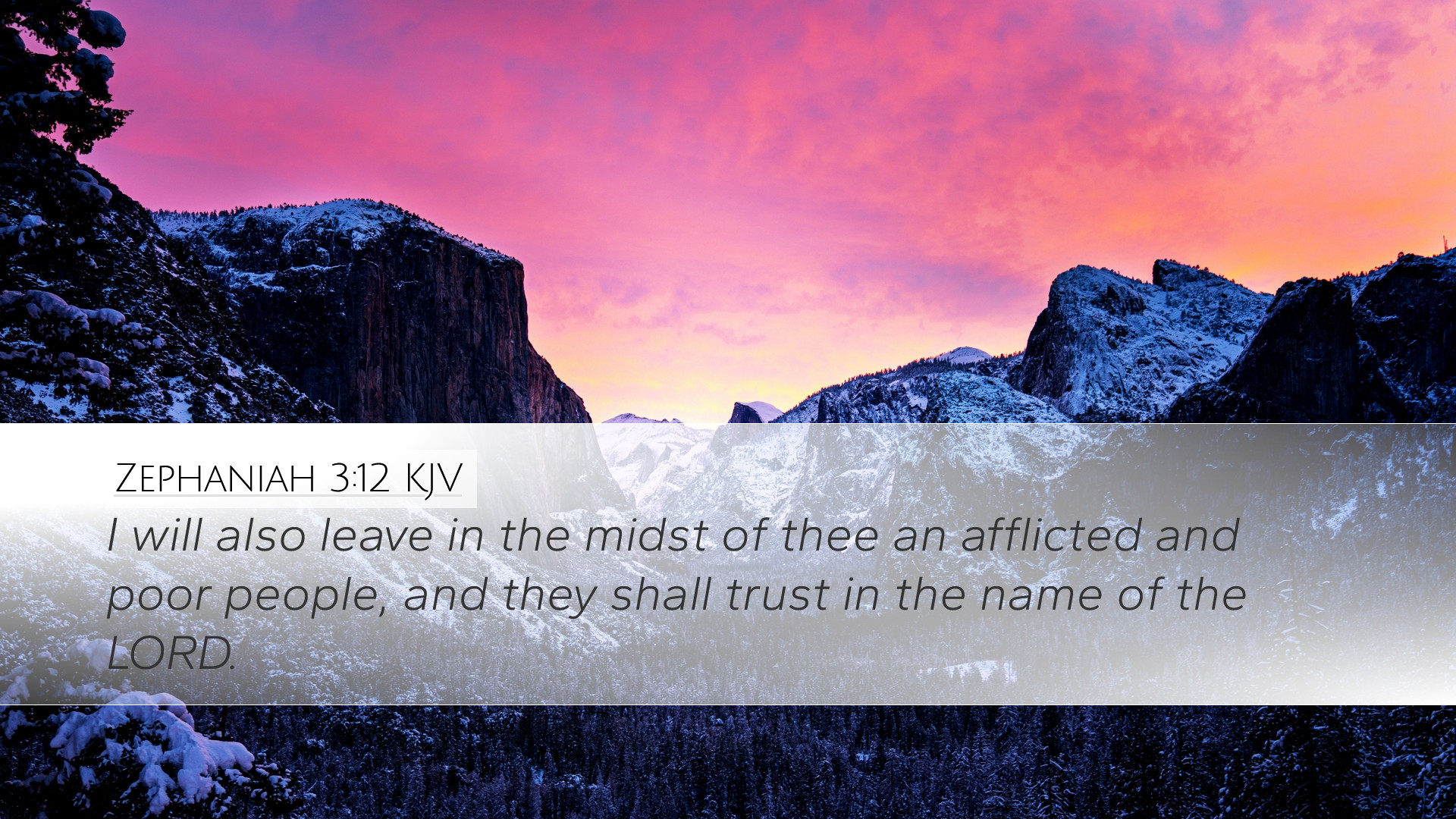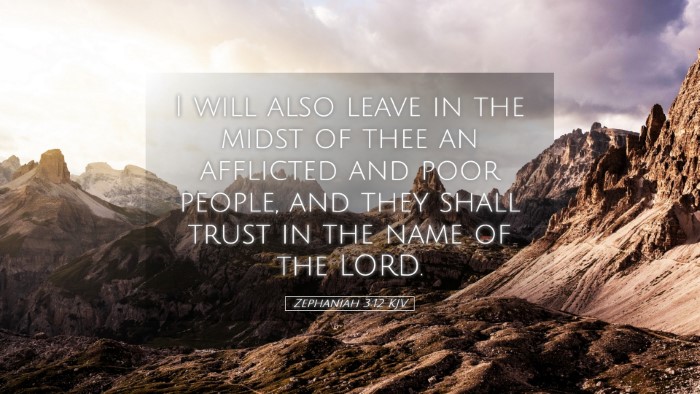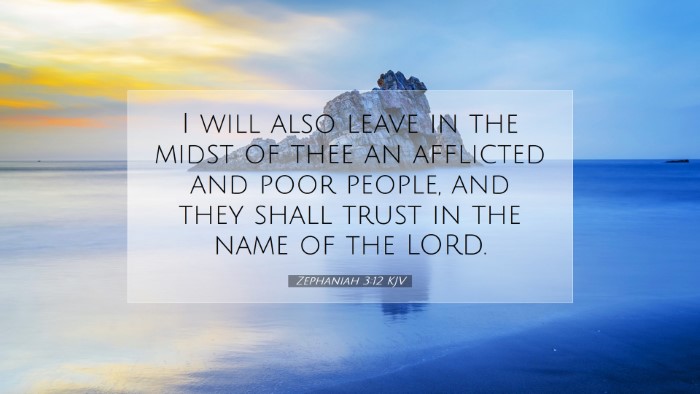Old Testament
Genesis Exodus Leviticus Numbers Deuteronomy Joshua Judges Ruth 1 Samuel 2 Samuel 1 Kings 2 Kings 1 Chronicles 2 Chronicles Ezra Nehemiah Esther Job Psalms Proverbs Ecclesiastes Song of Solomon Isaiah Jeremiah Lamentations Ezekiel Daniel Hosea Joel Amos Obadiah Jonah Micah Nahum Habakkuk Zephaniah Haggai Zechariah MalachiZephaniah 3:12
Zephaniah 3:12 KJV
I will also leave in the midst of thee an afflicted and poor people, and they shall trust in the name of the LORD.
Zephaniah 3:12 Bible Commentary
Zephaniah 3:12: A Commentary
Zephaniah 3:12 states: "But I will leave within you the meek and humble." This verse is a significant portion of Zephaniah's prophecy, conveying the promise of hope and restoration amidst the backdrop of God's judgment on Judah and other nations.
Context and Background
The Book of Zephaniah serves as a warning to both Judah and the nations surrounding her, calling for repentance before the advent of God's judgment. Written during the reign of King Josiah, it reflects the prophetic traditions that emphasize the necessity of returning to Yahweh. Zephaniah, being a descendant of Hezekiah, positions himself within a prophetic lineage that aims to restore true worship and justice in society.
The prophetic voice of Zephaniah emerges in a time when corruption and idolatry were rampant, leading the people away from the covenant relationship with God. Yet, amid this darkness, promises of a remnant and the establishment of a pure community arise.
Analysis of Key Terms
- "I will leave within you": This phrase indicates God's intentional act of preserving a faithful remnant from judgment. It underscores His sovereignty and commitment to maintaining a group of believers amidst widespread apostasy.
- "the meek and humble": These terms are crucial in understanding the character of those whom God cherishes. "Meek" denotes a sense of humility, gentleness, and submission to God's will, while "humble" reflects an attitude of lowliness and recognition of one's need for God’s grace.
Theological Implications
Zephaniah 3:12 serves as a profound reminder that God's grace is not entirely contingent upon human righteousness. Instead, it showcases God's mercy towards those who humble themselves before Him. This is consistent with the biblical theme that God opposes the proud but gives grace to the humble (James 4:6).
The identification of the meek and humble as the ones preserved suggests that true strength and spiritual resilience lie not in outward power or status but in a heart posture of dependence on God. This resonates deeply with the teachings of Jesus in the Beatitudes where He declares, "Blessed are the meek, for they will inherit the earth" (Matthew 5:5).
Insights from Public Domain Commentaries
-
Matthew Henry:
Henry emphasizes that this remnant will be characterized by their faithfulness and reliance on God amid trials. He interprets "the meek and humble" as those who are poor in spirit, recognizing their need for God’s help and grace. This alignment with God’s will positions them favorably in His sight, suggesting that these individuals will not only endure but thrive as they await God's promise of salvation.
-
Albert Barnes:
Barnes highlights the significance of God’s preservation of a remnant, suggesting that spiritual humility often accompanies a sincere faith. He elaborates on the implications of this promise for future generations, indicating that God's faithfulness transcends human failure. He notes that the promise taps into the broader narrative of redemption, reinforcing the hope of eventual restoration for God's people.
-
Adam Clarke:
Clarke points out the eschatological dimensions of this verse, suggesting that it not only pertains to Zephaniah's immediate audience but also encompasses a broader prophetic vision. He interprets the "meek and humble" as symbolic of those who will ultimately form God's new community – a transformative people defined by their relationship with Him, who will enjoy peace and security in the eschaton.
Practical Applications
This verse carries profound implications for the life of the believer today. It challenges modern Christians to embrace a posture of humility and meekness in a world often characterized by pride and self-sufficiency.
-
Embracing Humility:
It invites individuals to reflect upon their own lives, examining areas where pride may inhibit their relationship with God and with others. This humility is not self-deprecating but rather a recognition of one's position before an all-powerful God, leading to genuine worship and service.
-
Communal Remnant:
The concept of a remnant encourages communities of faith to nurture spaces where humility and meekness can thrive. This could manifest in fostering accountability, service, and mutual support within congregations and in broader society.
-
Hope for Restoration:
Finally, the promise embedded in Zephaniah 3:12 serves as a reminder of God's faithfulness to His people. In moments of despair, believers can find solace in the expectation of God's ongoing work in their lives, trusting that He will preserve them through their circumstances as they align themselves with His will.
Conclusion
Zephaniah 3:12 is rich in theological, historical, and practical insights that resonate through centuries. For pastors, students, theologians, and scholars, it is a call to recognize the value of humility and dependence on God. This enduring promise encourages believers not just to seek personal righteousness but to foster a community that reflects God’s grace and humility in a world often at odds with these virtues.


